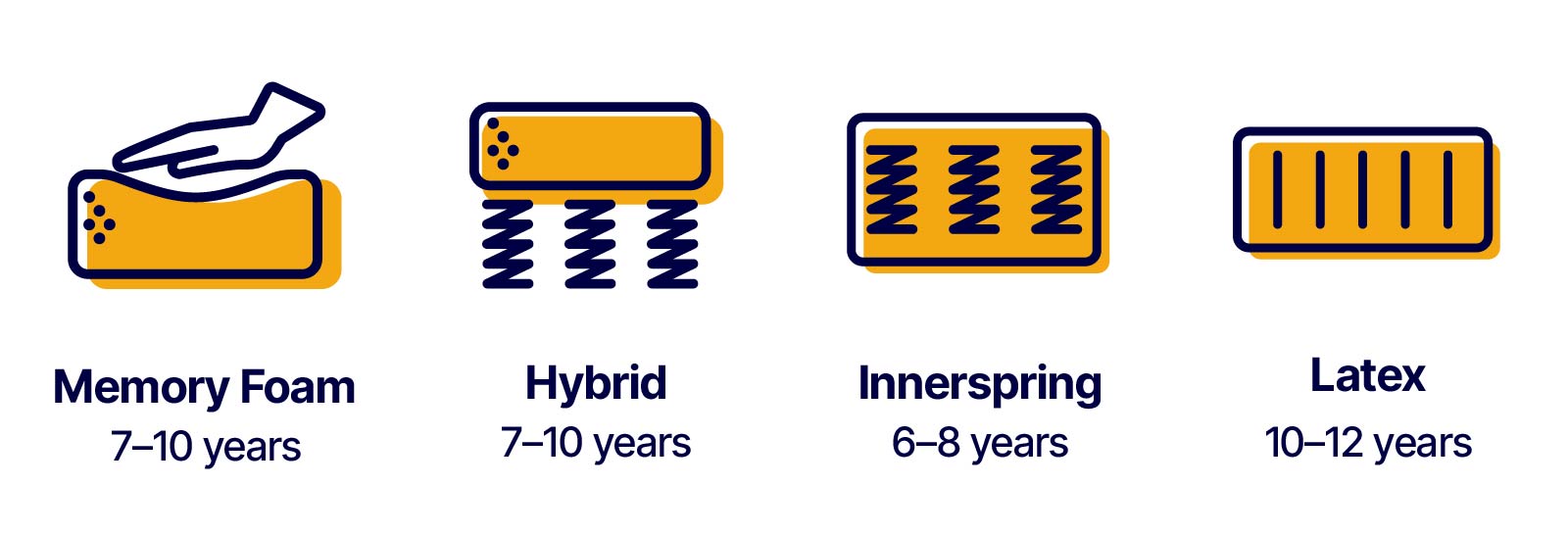How Long Should a Mattress Last? (2025)
Updated: March 3, 2025 | Published: July 2, 2024Most mattresses will last 6–12 years of nightly use. If your mattress is several years old and you’re still feeling tired after a full night’s sleep, the mattress could be the reason why.
Your mattress may be near the end of its lifespan if you’re seeing issues like these:
- You notice visual signs of age, like sagging, indents, or lumps
- The mattress is making new, unpleasant sounds
- You wake up with aches, a stiff neck, and a sore back
- The mattress has worn or frayed edges with signs of material wear
- You wake up with relatively new allergy-like symptoms, like congestion or asthma
The type of mattress also influences how long it will last. Generally, higher-density memory foam or combination foam will last longer than lower-density foam. The chart below gives you a general idea of the average mattress lifetime:
| Mattress Type | Average Mattress Lifetime |
|---|---|
Innerspring | 6–8 years |
Hybrid | 7–10 years |
Memory Foam | 7–10 years |
Latex | 10–12 years |
When is it time to replace my mattress?
If the mattress is older than 10–12 years, it may be time to replace it. You may notice visual signs, like sagging, indents, lumps, or the base of the mattress bowing. There could also be worn or frayed edges, rips, or thinner fabric in the area where you or your partner sleep. The mattress might even make noises it didn’t used to make, which can happen in older innerspring mattresses.
Or, you can find yourself waking up with discomfort you didn’t used to experience, like a stiff neck or a sore back. If the pain isn’t from an injury or strenuous activity, and it gets better throughout the day, your mattress could be the culprit. You could even be noticing congestion or asthma-like symptoms you didn’t have before, without any clear reason why.
All of these could be indicators that it’s time to replace your mattress. To make sure, try sleeping in a different bed for a night or two. If you sleep better, start thinking about a new mattress.
(Of course, if your mattress is in good condition and you’re still getting a good night’s sleep, you can continue using it as long as possible.)
READ MORE: Why you should buy a mattress online vs in-store
What are the benefits of sleeping on a good mattress?
Improved mood, healthy body and mind, regulated body functions and improved mental health are just some of the benefits of sleeping on a good mattress.
It’s easier to power through a challenging day when you’ve had a restful sleep the night before. High-quality sleep gives your body the chance to rest and repair. It also reduces stress, improves your mood and work performance, enables good decision-making, and makes it easier to stay alert during important tasks.
While we all go through phases where our sleep can be affected, replacing an old mattress is one of the fastest and easiest ways to improve the quality of your sleep.

What should you keep in mind when looking for a new mattress?
There are some key considerations that can help you narrow down your choices when it’s time to think about replacing your mattress:
- Weight: The more your body weighs, the more you will enjoy a firmer sleep surface.
- Back Pain: If you have back pain, you’ll want a mattress that helps you stay comfortable while keeping your spine properly aligned. (And make sure you’re using the best sleeping position for lower back pain.)
- Firmness: Choose a mattress with the right firmness level for your sleep style. For example, side sleepers often want a softer mattress, while back sleepers may prefer something firmer.
READ MORE: How to choose the right mattress firmness
- Bed Sharing: If you share your bed with a partner, kids or pets, choose a medium-firm mattress that fits everyone’s different sleep needs.
- Mattress Type: There are several different types of mattresses to choose from, like foam, innerspring, hybrid, and latex. Each has different characteristics that are a good fit for a variety of sleep styles.
- Budget: Set a budget for your new mattress and look for limited-time deals and promotions online.
- Temperature: If you’re a warm sleeper, look for a mattress that promotes airflow and reduces heat. You might find better luck with a latex or hybrid mattress rather than strictly memory foam.
READ MORE: Get our guide to the best cooling mattresses
- Motion Isolation: Pay close attention to motion isolation if you share your bed with a partner, kids, or pets. The higher the motion isolation score, the less you’ll notice movement from the other side of the bed.
- Edge Support: If you like to sit on the edge of the bed, look for a mattress with good edge support to keep your body supported in any position.
- Bounce: If you have trouble getting out of bed in the morning, you might prefer a mattress with extra bounce.
- Contouring: Contouring materials like memory foam help support your body in all the right places. That said, too much “hug” can cause overheating and make it hard to move, so find the level of contouring that’s best for your body.
- Responsiveness: A responsive mattress allows you to change positions easily without feeling stuck.
- Noise: Get a quiet night’s sleep with a mattress made from noise-quieting materials like foam or latex.
- Company Policies: Get details about the manufacturer’s sleep trial, return policy, and product warranty so you know what you’re getting into.
READ MORE: Find out which mattress size is right for you
How can you help your mattress last longer?
When you’re buying a new mattress, you will likely wonder “how long will a mattress last?” and “how can I make it last longer?” The fact is, there are many factors that can influence how long your mattress will last. These are just a few:
1. Rotate your mattress regularly
Just like the tires on your car, mattresses should be rotated on a regular basis to ensure even wear. People used to flip their mattresses, but today’s manufacturers sell mattresses with specific layers for a specific purpose. This means you can’t flip a mattress and still expect it to work properly.
Instead, rotate your mattress roughly every 4 to 6 months. This will help you avoid making long-term dents or divots in the same area of the mattress. It’s especially important if you share your bed with a differently weighted partner, which could create uneven wear on the mattress.
2. Use a good-quality mattress protector
A waterproof mattress protector keeps your mattress safe from spills, stains, dust, allergens, and even just good old sweat stains. Since liquids and stains can break down the materials in your mattress over time, investing in a mattress protector will keep your mattress clean, hygienic, and serviceable for longer. Try to find a machine-washable mattress protector for extra convenience.
READ MORE: How to wash a mattress protector
3. Keep your mattress clean
Cleaning your mattress prevents liquids and stains from breaking down the mattress’s materials over time. If you don’t have a mattress protector, you should vacuum and wipe down your mattress cover every month or so. Spot-clean any spills or stains as soon as possible.
4. Use a proper foundation
Make sure your mattress has a sturdy bed frame that evenly distributes weight. This should include at least one or two study crossbars and slats that are no more than 3″ apart. Or, you can use a solid, level base that supports every part of the mattress. Whatever you choose, a proper foundation will keep your mattress from sagging and help it last longer.
READ MORE: Types of bed frames: which style is right for you?
5. Be mindful of weight on the mattress
Mattresses are meant to be used, but be aware of how much weight is applied to the mattress and how often. If you’re a heavy sleeper, you may want to rotate the mattress more often than the recommended 4–6 months. And as fun as it is, avoid jumping on the bed—the pressure can cause your mattress materials to break down faster.
6. Wash bedding regularly
Just as we wash our clothes often, our bedding needs to be washed regularly, too. Try to wash your sheets at least weekly. This will keep your mattress surface fresh and free from dust, sweat, and mildew. It also feels great to sleep beneath clean sheets, and you deserve a comfortable night’s sleep.
READ MORE: Which is better: bamboo vs cotton sheets?
How long does a mattress last, depending on the type?
Mattresses can last different lengths of time depending on their type and construction. Let’s break it down by mattress type.
How long does a memory foam mattress last?
The average memory foam mattress lasts 7–10 years if it’s used nightly. Generally, higher-density memory foam or combination foam will last longer than lower-density foam. If you notice you’re sinking into the mattress more than you used to, consider it a sign that it’s time to buy a new mattress. (We think you’ll like Octave, our top memory foam mattress pick.)
How long does a hybrid mattress last?
Hybrid mattresses last 7–10 years on average. The combination of foam and metal coils can be long-lasting, but as with any mattress, it all depends on how you use it. Heavier sleepers, poor environmental conditions, frequently moving the mattress, and other factors can all reduce its lifespan. (Shopping for a hybrid? Consider Logan & Cove, our top pick for Best Hybrid Mattress.)
How long does an innerspring mattress last?
Innerspring mattresses have the shortest lifespan at around 6–8 years. Yours may last longer depending on the type of coils, how they’re made, and how durable the mattress cover is. The higher the quality, the longer your mattress will last. However, innerspring mattresses aren’t typically known for their quality.
What mattress type lasts the longest?
Latex mattresses tend to last the longest, with an average lifespan of 10–12 years. Some high-quality organic or natural latex mattresses last longer, but it depends on the blend of natural and synthetic latex. Other materials can affect lifespan, too, such as a latex hybrid bed that also contains coils.

What is the average mattress warranty length?
Mattress warranty lengths vary widely, but the average is 5–10 years. You can use a mattress’s warranty length as a guidepost for expected lifetime. A shorter warranty could indicate the mattress isn’t intended to last very long, while a longer warranty could suggest a higher-quality mattress with an extended lifespan. For example, Douglas offers a 20-year warranty on all of its foam mattresses.
At the same time, a “lifetime” warranty doesn’t always mean a long-lasting mattress. “Lifetime” refers to the lifetime of the mattress with normal use—and only for as long as you own the mattress. Some companies offer a lifetime warranty but have a list of limitations that restrict warranty claims. We recommend reading the warranty’s fine print before you buy a mattress.
What does a mattress warranty include?
A mattress warranty should be written in plain, everyday language that explains the following:
- Who the warranty is for
- What products are covered and for how long
- What types of damage are and aren’t covered
- Any consumer responsibilities
- Disclaimers or limitations on liability
- Legal considerations like arbitration and governing law
- How to make a claim under warranty
- Who the warrantor is
When you’re buying a mattress, check the warranty terms and conditions to make sure you’re covered in case of future claims. This is just one way to make sure you’ll be happy with your new mattress for the next 6–12 years.
Our goal is to provide the information you need to find the mattress that’s right for you. Get started with some of our most popular mattress shopping resources:
- Best Mattress Guides: Best Mattress Canada, Best Mattress In a Box
- Reviews: Douglas Original, Logan & Cove Choice, Juno, Octave Vista
- Comparisons: Douglas vs Endy, Douglas vs Casper
We use independent, third-party engineering firms (commissioned by us) with the APEGA stamp of approval to conduct mattress testing on our behalf, using publicly available data. We review and test all mattresses on 40+ criteria we think are important to you, including price, country of manufacture, sleep trial, warranty, features, materials used, motion isolation and edge support ratings, customer satisfaction reviews, returns, and refunds.






